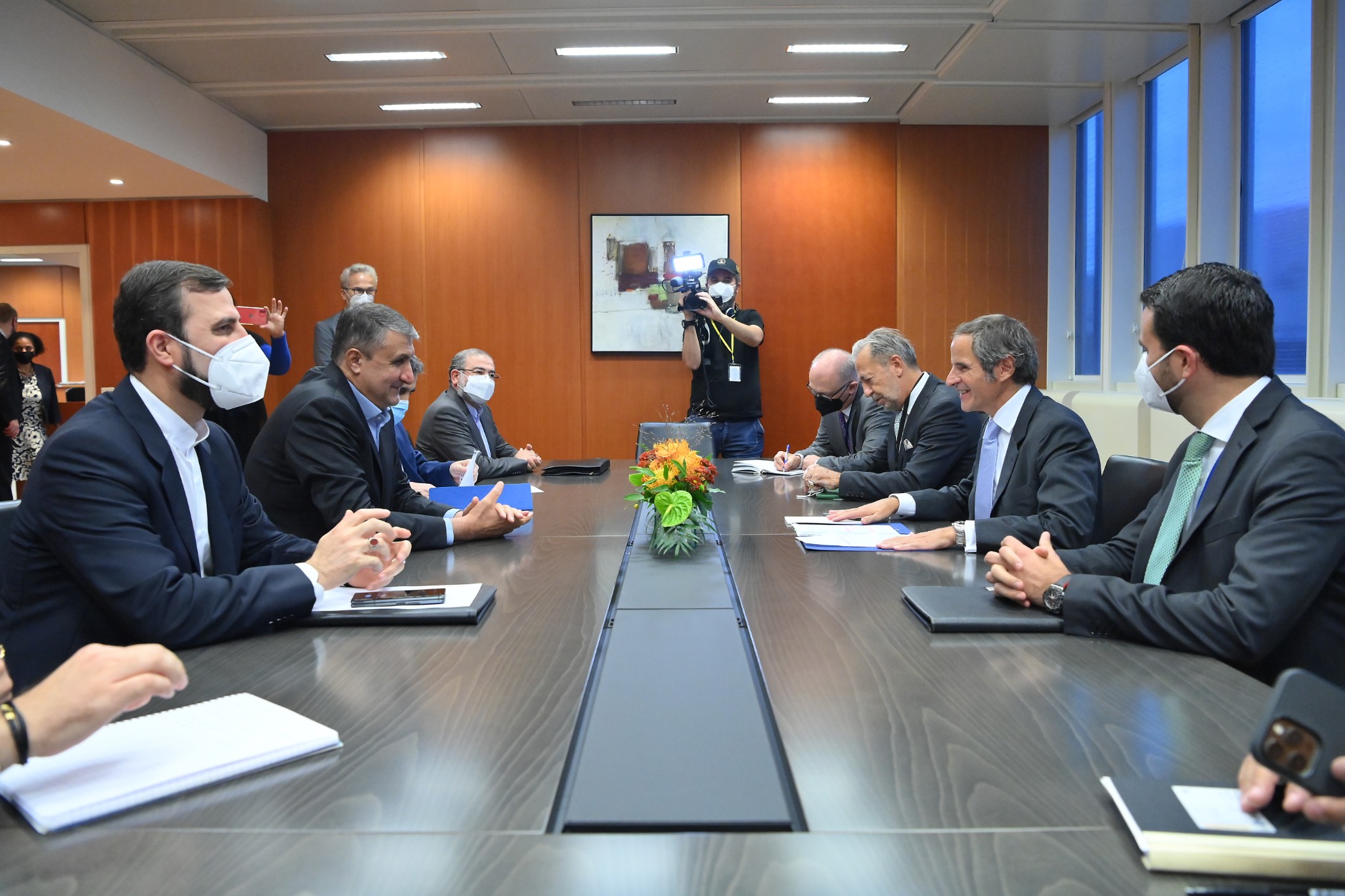 Director Gen. Grossi and AEOI Chief Eslami at a bilateral meeting. Credit: IAEA
Director Gen. Grossi and AEOI Chief Eslami at a bilateral meeting. Credit: IAEA
U.S. Influence in Iran Nuclear Negotiations Made Weaker by its Unilateral Sanctions
Talks on reviving the Iran nuclear deal will resume on November 29. However, with a new hardline president, Ebrahim Raisi, negotiations are likely to be difficult, especially when it comes to easing sanctions.
In 2018, the U.S. unilaterally withdrew from the nuclear deal, imposed new sanctions, and called for a better deal, going beyond limitations on Iran’s nuclear program, and adding additional demands on Iran’s conventional weapons and international policies. This move placed the U.S. in an isolated position among its allies, and has only brought Iran closer to a nuclear weapon. It has led to further escalations between the two countries, drone strikes, retaliations, and new sanctions on the country’s drone program. The recent dispute and differing views about the seizure of an oil tanker further escalated the situation. Iran’s most recent response to the U.S.-imposed sanctions included a large-scale military exercise to demonstrate power and prepare for possible conflict.
However, compared to other alternatives, sanctions remain an important foreign policy tool. They serve to improve negotiating leverage, are imposed to find a diplomatic solution, and intended to avoid armed conflict. They are used both punitively and to change behavior in the target country. Sanctions can be either comprehensive or targeted (smart sanctions). The former includes extensive trade restrictions, prohibits commercial activities for an entire country, affects the entire country, and harms innocent civilians. The latter is intended to affect a target group and restrict transactions by and with specific individuals or entities; for example, arms embargos, trade restrictions and investment bans, frozen assets, or travel bans.
The use of sanctions is not risk-free. Some caution against overuse, as it could reduce the effectiveness of sanctions regimes and weaken U.S. economic leadership. Especially with regards to authoritarian regimes, sanctions might generate sympathy with the regime and create a rally-round-the-flag effect amongst the population, or be used to excuse government mismanagement. They can also affect other countries with which the sanctioning country maintains economic relations. This occurs particularly when imposing secondary sanctions which are intended to dissuade third-country actors from trading with the target country. Sanctions can also create more room for smuggling and other spurious economic activities.
As a country under sanctions for many years, Iran has been making itself more resilient against their use. It has deployed front companies or shell corporations across the Middle East, Asia, and Europe. The use of accounts in other countries, the creation of joint banks, and the use of hawala financial transfer systems became a part of the country’s strategy. Dubai became an important re-export hub, and Iran shifted to other markets—Russia, and China—that do not always support U.S. sanctions.
Thus, many factors can reduce the effectiveness of sanctions, and sanctions alone are unlikely to produce the desired results. While they can go hand in hand with threats of military action, they must also provide positive incentives and concrete offers. In Iran’s case, sanctions imposed under the Trump administration left the country with no acceptable options. Also, the application of unilateral sanctions jeopardizes their effectiveness and questions the imposing party’s credibility among its allies and partners.
For sanctions to be successful and to achieve their intended goal, they must be broadly internationally supported and linked to a larger diplomatic strategy. Sanctions imposed under the Obama administration were supported by the international community, including the UN, the EU, and both Russia and China. Thus, those sanctions helped bring Iran to the negotiating table in 2015. Sanctions must be designed to be flexible and adaptable to the stated policy goal. An incentive system must be created that is flexible enough to either reduce or increase the sanctions for the target country in the event of compliance or disregard. Above all, the sanctioned party should know what realistic changes in their behavior will lead to a reduction or elimination of those sanctions; their purpose is to persuade the state to change its behavior in ways that will enable those sanctions to be lifted. In 2016, after the IAEA confirmed Iran’s JCPOA compliance, further international sanctions were lifted.
Sanctions applied by the former administration did not achieve their intended goal. Sanctions are not intended to replace good policy, but to help its accomplishment. Regarding the upcoming talks, the lifting of nuclear-related sanctions could come with humanitarian assistance or other cooperative actions that could encourage more cooperative behavior by Iran. The U.S. could help Iran against Covid-19, while supporting basic human needs. This does not necessarily change the difficulty of the talks, but could benefit overall U.S. policy, is reflective of U.S. values, and is in line with the recommendations of the Treasury 2021 Sanctions Review.





